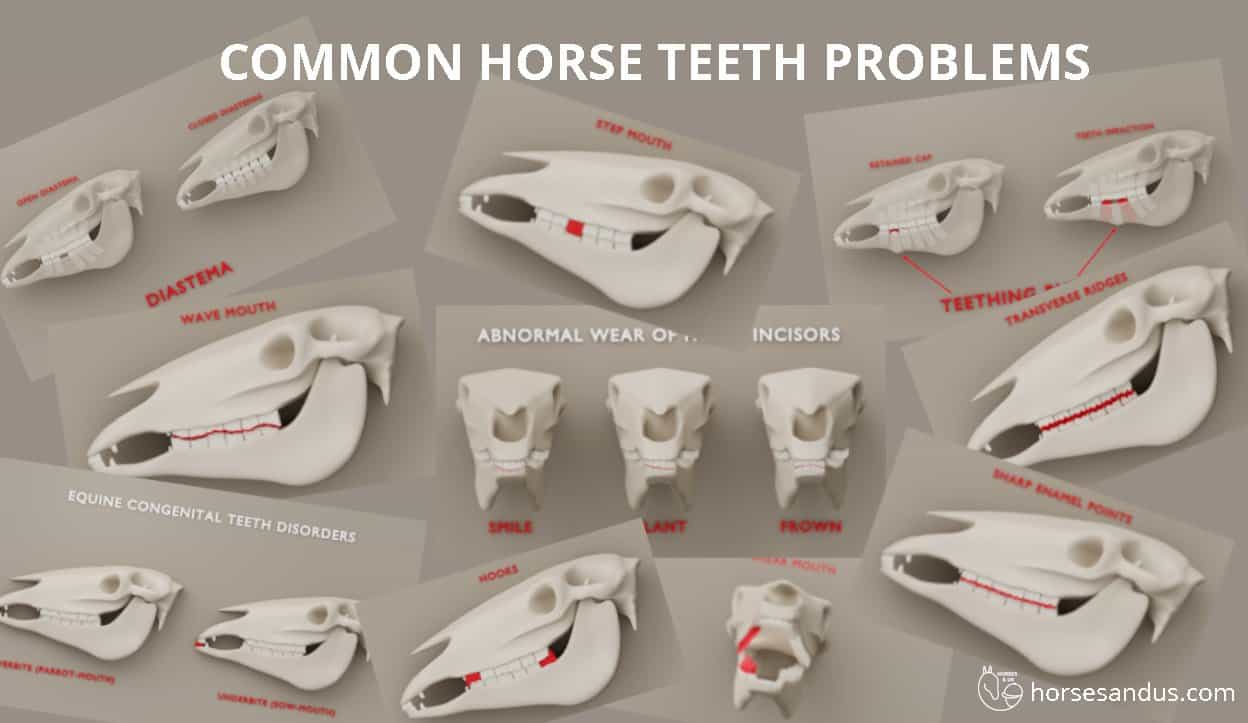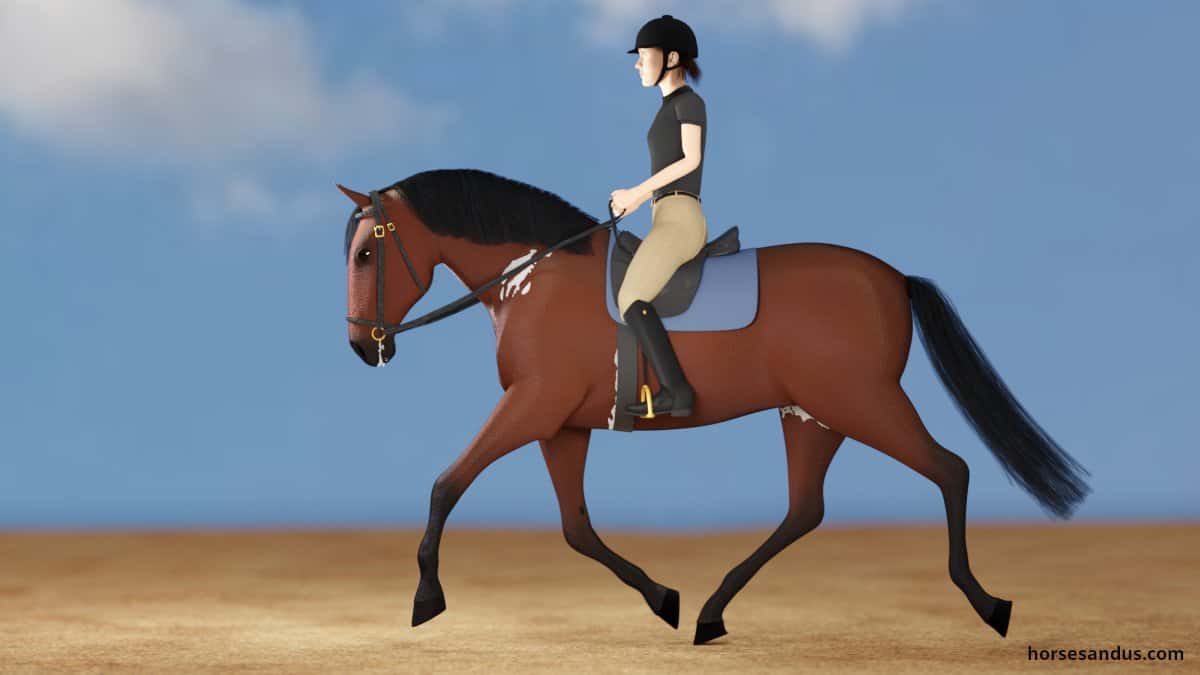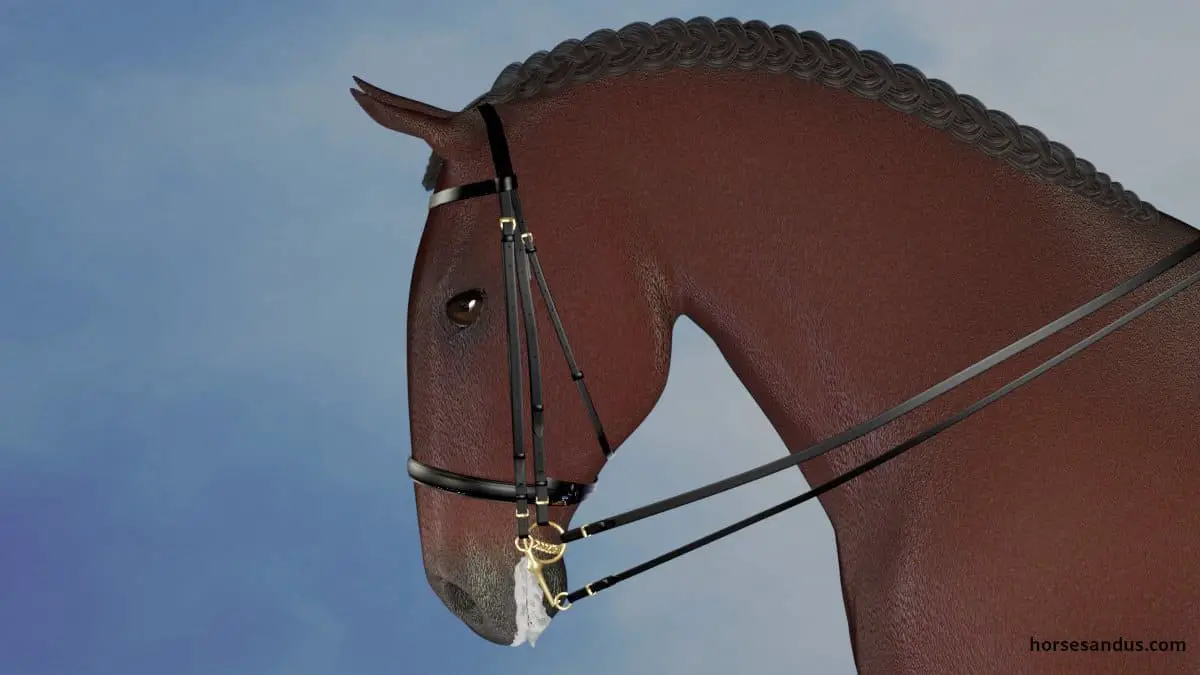Water is an essential and irreplaceable nutrient for the horse. It is vital to aid digestion and to maintain body temperature, among other life-supporting functions. Knowing about horses drinking habits will guide you in ensuring their well-being and survival.
Horses need plenty of water every day. If they do not drink enough, they will manifest decreased performance, loss of appetite, and dehydration. This can lead to a serious condition called impaction colic, which is both painful and potentially life-threatening.
Since water is vital for horses, it’s crucial to provide them with constant access to clean, high-quality water.
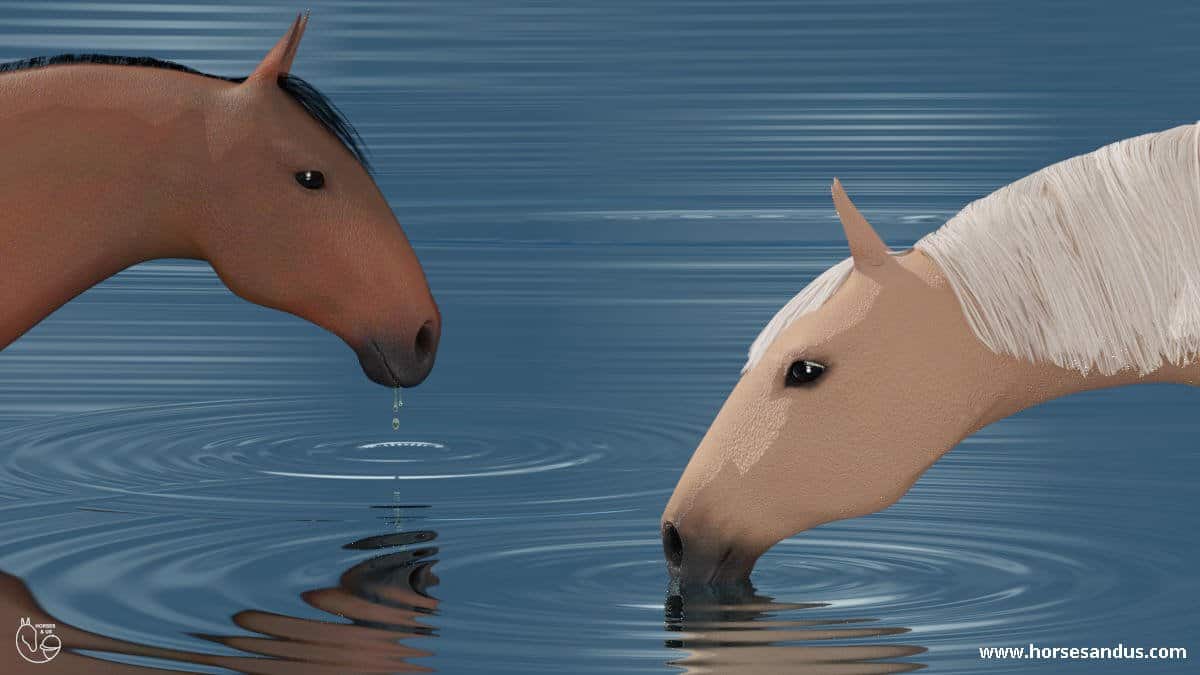
Keep reading to know all about horses’ drinking habits and how to prevent health issues related to water consumption.
How Much Water Does an Average Horse Drink Daily?
An average-sized horse (1,100lb/ 500kg ) with a limited activity level and living in a moderate climate, will drink approximately 5 to 10 gallons (20 to 40 liters) of water a day.
However, the amount of water a horse drinks will vary considerably depending on certain conditions.
- A horse will drink more if the weather is hotter, his activity level increases, and he eats dry feed such as hay.
- A horse will drink less if he is sedentary, eats green pasture, and the weather is cooler
The article about how much water horses drink a day will take an in-depth look at 7 factors that influence the horse´s daily drinking amounts.
But ultimately, what matters is that the body’s water balance is maintained (see image). Horses will usually consume as much water as they need if given access to plenty of clean and good quality water.
The amount of water a horse intakes (fluids, food, metabolism) is determined by the amount of water that he loses (feces, urine, sweat, and milk in case of lactating mares).

Why Do Horses Need so Much Water?
The two main reasons why horses need so much water are digestion and thermoregulation.
1. Digestion
The horse´s digestive system needs lots of water to function properly.
Their natural diet is rich in fiber from grass and hay, which requires large amounts of water to move the fiber through the digestive tract.
If horses do not consume enough water, the fiber gets stuck and blocks the digestive tract. This can lead to impaction colic, which is a very serious life-threatening condition.
2. Thermoregulation
When the horse’s body temperature increases due to exercise or a hot environment, they rely on sweating to cool it down.
Depending on the intensity and duration of the exercise and how hot the weather is, a horse may need to sweat heavily, leading to large amounts of water loss.
To replenish their system with these water losses, they need to compensate with equivalent quantities of water intake.
Do Suckling Foals Need To Drink Water?
Mare’s milk contains a high concentration of water (almost 90% according to this source). So you may wonder if suckling foals need to drink any water at all.
Foals may not have much need for water during the first days, but they imitate their mother and so you can see them exploring water as early as the day they are born.
Foals will start nibbling at pasture on the first days of their life, which usually goes along with drinking sips of water.
As they grow older and eat more solid feed, their water intake also increases:
- By one month old, they drink about 4 liters (1 gallon) of water per day.
- By two months, water intake increases to 5,5 liters (1,5 gallons)
A foal’s water intake will increase with age, but milk intake will not. Mare’s milk production will start to decline after two months.
According to this source from Kentucky Equine Research, Feral foals were seen spending:
- 18-24% of their day grazing at 2 to 4 weeks.
- 42-45% at 20-28 weeks.
- 73% at 5 months of age.

Can Horses Drink Too Much Water?
Healthy horses typically do not drink more than their body´s capacity.
- Horses rarely drink more than 5% of their body weight daily (25 liters per 500 kg / 6 gallons per 1100 lb)
- Horses rarely urinate more than 3% of their body weight daily (15 liters per 500 kg / 4 gallons per 1100 lb))
But there are some diseases that can lead horses to drink too much water which can cause:
- Excessive urination placing additional stress on the kidneys to eliminate the extra water.
- Dilution of the electrolytes in the horse’s body which can reduce sweating and, therefore, the ability to regulate body temperature.
Equine diseases that cause excessive drinking are:
- Cushing´s disease
- Chronic renal failure
- Hepatic Insufficiency
- Diabetes
Some people are concerned that immediately after intense exercise, a horse may drink too much water, and will not allow him to drink freely until he cools down, but this is not necessary.
A horse should be allowed to drink as much as he wants after intense exercise. According to this source, research has demonstrated that horses will not drink beyond their body capacity, even in the first minutes after exercise.
But if you do not feel comfortable letting your horse drink freely after exercise, then you can allow him to drink water within small intervals. Still, you should definitely give him water immediately after exercise.
Why Do Horses Sometimes Refuse To Drink Water?
There are some reasons why a horse will refuse to drink water, even to the point where he will self-inflict a dehydrated state and risk impaction colic. The most common reasons are bad quality water, unpalatable water, unfamiliar water container, or stress.
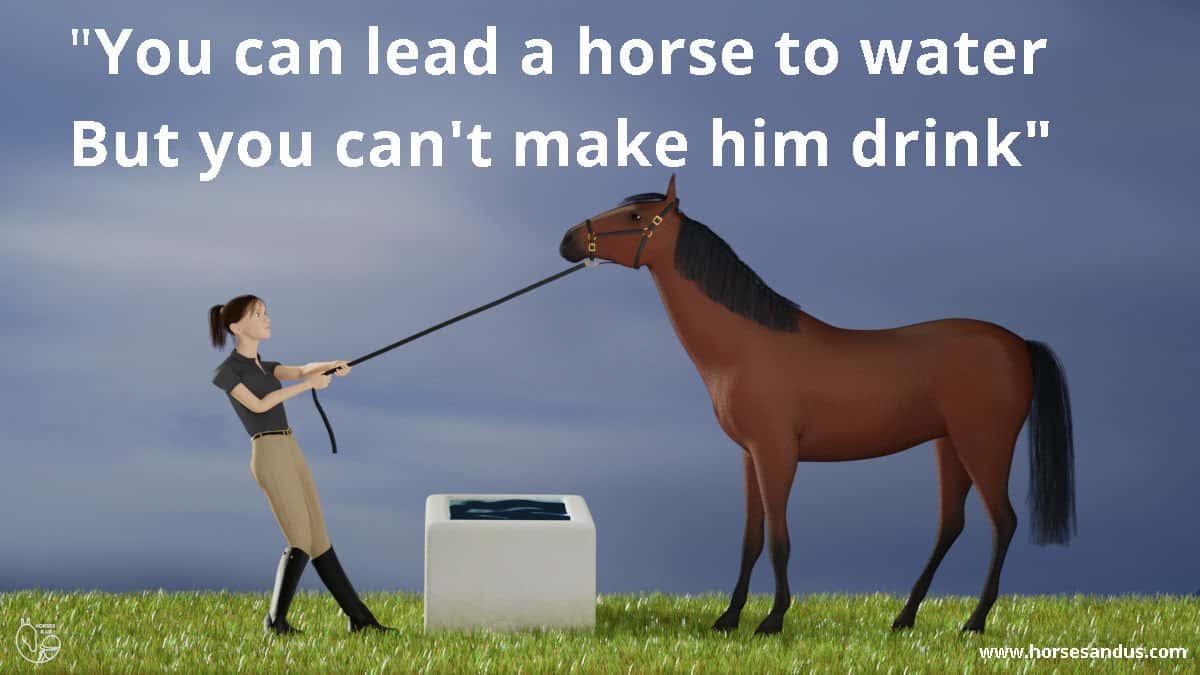
Water consumption is vital for a horse, and we become very anxious when we experience situations where our horse refuses to drink.
So we must understand why horses will not drink so that we can manage the situation.
Following are the 4 common reasons why a horse will refuse to drink water:
1. Bad Quality Water
Horses are very sensitive to smell and taste. So if the water is contaminated with dirt, feces, and urine or is foul-smelling, horses will not drink it, even if they are thirsty.
2. Unpalatable Water
Irrespective of whether the water is clean or not, if it is not palatable to the horse, he will not drink it.
Palatability can be affected by varying PH levels and total dissolved solids (TDS) levels (concentrations of minerals such as calcium, magnesium, potassium, and sodium)
This explains why horses also will not drink unfamiliar water because these levels will be different in various locations and water sources.
3. Unfamiliar Water or Bucket
If a horse travels to a location where the water does not have the same taste as the water he is used to drinking at home, he will not drink it.
If your horse is picky about drinking water away from home, then try this trick. Before taking him to another location, try flavoring the water he usually drinks at home, with apple juice or beer. Then use the same flavor in the water at the new location.
Also, if the water bucket or trough is unfamiliar (smells different or has a different shape than his usual container), he will not drink water from it.
4. Stress
A stressed horse is less likely to drink enough water.
Transportation and horse shows are common events that cause stress in horses. Transportation, in particular, means stress!
There are several factors that cause stress and fatigue during transportation:
- Sense of confinement
- Noise and vibration
- Balancing and bouncing
- Poor ventilation
- Presence of exhaust gas
- Separation from the herd
- Strange environment
Under these conditions, the horse will feel stressed and will be reluctant to drink water during stops and at arrival.
How Can I Get a Horse to Drink Water?
A horse can refuse to drink water, even when he is starting to dehydrate!
This will inevitably cause us lots of emotional distress, and we will try anything to help him drink because we know that his life depends on it!
There are some strategies that you can use to help your horse drink more water.
8 Tips To Get Your Horse To Drink Water
1 – Monitor his water consumption closely.
You can easily monitor his water intake if he drinks from buckets.
If he is drinking from natural sources such as ponds, lakes, rivers, or from automatic water troughs, it will be almost impossible to monitor his water intake. In these cases, you need to monitor his manure production. Look for signs of dry manure or reduced manure production.
There is an interesting device for monitoring a horse’s water consumption that you may like to check out here (http://www.hydrasure.ie/)
2. Clean his water source or provide an alternative trough
Horses will not drink dirty and unpalatable water.
3- Flavor his water
Horses may not drink unfamiliar water. If your horse is going to another location, take some water from home or use a familiar flavor. You can add apple juice or some other fruit flavor. Also, beer is a taste that horses enjoy.
4- Give him lukewarm water
Horses do not like to drink cold water, especially in the winter.
5- Change his water container
If you have changed his drinking container recently, he may not drink from it because it is unfamiliar.
6- Give him an electrolyte supplement or salt
Give him an electrolyte supplement or 1 or 2 tablespoons of salt every day in his feed and make sure he has access to a salt block at all times.
Electrolyte supplement or plain salt will stimulate his thirst. But be careful because giving horses electrolytes can cause further dehydration if he does not drink enough water.
7- Feed him meals soaked in warm water
Feeding your horse a bran mash or damp hay will provide some water intake that can help avoid dehydration.
8- When traveling, stop every 3 to 4 hours to give your horse water and make sure he drinks enough before starting to travel
Although a horse may refuse to drink water during travel you should still insist.
If you have tried everything you can, but your horse still refuses to drink, it is time to call your veterinary. Don’t wait for him to dehydrate and have an impaction colic.
How long can Horses Go Without water?
While a horse can survive almost a month without food, he can only survive 3 to 6 days without water.
- After 2 days they will refuse to eat and start to show signs of dehydration and colic.
- After 3 to 4 days the horse´s organs will begin to shut down which can lead to irreversible damage to the organs.
Naturally, there are several factors that influence how long a horse can go without water.
If he is idle and eating green pasture during cool weather, then he can survive longer without drinking water than if he is eating dry hay and sweating a lot due to exercise in hot weather.
If you suspect your horse is not drinking enough water, you must take swift action to prevent life-threatening conditions due to lack of water.
You should check for signs of dehydration and call a veterinarian if the condition is severe.
What Are The Signs Of Dehydration In Horses?
Dehydration occurs when the horse loses more fluids than it consumes, and the body doesn’t have enough water and electrolytes to perform its life-supporting functions.
First of all, you need to become familiar with the horse’s vital signs and visual appearance when your horse is in a healthy condition. This way, you can recognize any unusual signs that may indicate dehydration.
Early signs that may indicate dehydration
- Elevated heart rate or pulse (Dehydration makes the horse’s heart work harder)
- Gums are dry and pale-colored
- Decreased skin elasticity
Signs of a more advanced stage of dehydration
- Tucked up appearance in the abdomen (drawn up flanks)
- Sunken eyes
- Lethargy and depression
- Gums that are dark- brick red, blue, or purple

Dehydration is a dire situation for a horse, and we need to act swiftly to detect it and take action. You can perform some quick tests to check if the horse is dehydrated.
You should practice these tests and observe the results when your horse is in its normal state so that you can notice any anomalies in case of dehydration.
Horse Dehydration Pinch Test
When a horse loses water, his skin becomes less elastic. We can check this by performing the pinch test:
- Grasp a fold of the horse’s skin at the shoulder
- Pull it gently up into a slightly raised tent.
- Then let go
If the skin flattens back immediately, then the horse is hydrated. But if it takes 1 or 2 seconds, he is moderately dehydrated, and if 4 or more seconds, he is seriously dehydrated.
If the skin does not return to its natural position after 10 seconds, you should call your veterinarian urgently.
This test is simple, but not always accurate. That is why it is important to do this test when the horse is in good health condition so that you can detect an abnormal result.

Horse Dehydration Capillary Refill Test
Another way to check if your horse is dehydrated is to perform the capillary refill test:
- Push your horse’s upper lip back to show the gums
- Push your thumb into the gum for one or two seconds
- Remove your thumb
There will be a pale spot where your thumb squeezed the blood out of the capillaries.
If the horse is in good condition and hydrated, the blood capillaries will refill quickly within 1 or 2 seconds. The pale spot will return to its pink color.
If your horse is dehydrated, it will take longer for the blood vessels to refill, and the spot will remain pale for a longer time.

Avoiding dehydration is always a much better plan. So first and foremost you should monitor your horse’s water intake and make sure he always has access to plenty of fresh water.
How do Horses Drink Water?
Have you ever observed a horse drinking? It is a very interesting and even amusing procedure to watch.
- First, he will start by splashing the water with his muzzle, especially when drinking from a container that has stagnant water.
- Then he will dip his mouth in the water, and with his jaws shut, he will open his lips and suck the water. Similar to the way we drink from a straw. You can see their throat pulsing as they swallow the water.
- Finally, he will raise his head out of the water and start chewing and licking as water spills out of his mouth
Also, you may be interested to know that horses spend only five to six minutes a day drinking water, which can be done with several visits to the water source.
Sources of Drinking Water For Horses
Horses can drink out of natural surface waters such as rivers, creeks and lakes, and ponds. They can also drink out of human-made water channels, ponds, troughs, and buckets.
Whatever the water source, there are mainly two concerns that every horse owner should have: Water quality and water temperature.
Water quality
Horses rarely have access to pure water. Any source of water, whether natural or human-made, can be contaminated.
If the quality of the water is poor, it can be unappealing to horses, and they will not drink it. But even worse, they may drink it because the contaminants do not affect the taste and smell, but it can cause toxicities or carry diseases.
Water temperature
In some places, the winter can be especially harsh, with very low temperatures that can freeze lakes, ponds, and troughs. In this situation, horses will be completely deprived of water. Even if the water is not frozen, it will be very cold, and the horse may not consume sufficient quantity.

Natural Water Sources
Natural water sources can provide horses with good quality water, and are generally the preferred sources. However, you need to check that they are safe for your horse to drink from.
The natural water sources can be contaminated by:
- Agricultural chemicals or manure from runoff.
- Blue-green algae can develop in the water. These algae produce cyanobacteria, which are extremely harmful to horses, causing liver damage.
- Bacteria and viruses. Although not all of these organisms are harmful or exist in dangerous quantities. They can into the water via mosquitos, horses stepping into the water or decaying of organic matter.
- High concentrations of some minerals, like calcium or nitrate, can be toxic or cause chronic health issues.
- Water can be sandy or muddy, which can cause sand colic.
To avoid problems from contaminated water sources that cannot be cleaned, you should provide alternative sources such as troughs or buckets.
In case water is frozen you should provide heated or insulated troughs.
Human-Made Water Sources
Human-made water sources can provide suitable water because the quality is easier to control.
However, you need to do the necessary maintenance to ensure the water is fit for your horse to drink.
In case water is frozen you should provide alternative heated or insulated troughs.
Water Tanks, Troughs or Buckets
These human-made water containers require constant vigilance and maintenance because they can also be contaminated.
- When using water containers that allow the water to be stagnant for long periods, they are subject to dangerous blue-green algae growth.
- The horse´s feces and urine may end up in the water container.
- Disease spreading mosquitoes can fall into the water and contaminate it with bacteria.
- Also, bacteria from decaying animals such as birds or mice that fall into the tank, trough, or bucket can contaminate the water.
You can provide an escape route for these animals that fall into the water trough. This has the double benefit of saving the lives of the little animals that fall in and keeping the horses drinking water safe.
The links below that lead to products on Amazon are affiliate links and I earn a commission (with no additional cost for you) if you make a purchase.
Check out this really efficient animal-saving escape ramp in the link below:
Swimline FrogLog Animal Saving Escape Ramp for Pool, Blue, One SizeCleaning water in small containers (small troughs and buckets)
If the water looks murky and dirty or foul-smelling, it needs to be dumped and replaced with fresh water. But before replacing it with clean water, make sure the container is also clean from algae and dirt.
Scrub the inside of the trough or bucket by using water and a stiff brush. Turn it upside down to drain and then leave in the sun for some hours before refilling with clean water.
Cleaning water in big containers (big troughs and tanks)
If water troughs or tanks are big, they may be difficult or impossible to clean. You can try one of the following solutions instead:
- Add some drops of bleach to sanitize the water (bleach contains chlorine, which is the same additive used in public water systems and pools).
- Put some fish in the water trough or tank to eat the algae. Certain species of fish help clean up the pond.
Note: You should never place both fish and bleach together because the bleach can kill the fish.
Automatic Troughs
Automatic water troughs are an excellent alternative because they require less maintenance to keep the water suitable for horses to drink
These troughs avoid the problems of stagnant water because they allow the water to circulate. So there is no need to frequently dump “old” water and clean the trough, which is a waste of time and water.
However, the size of the trough should be appropriate for the number of animals that will drink from it. If the size is too big, the horses will not empty it, and the water ends up being partially stagnant and quickly getting dirty and full of algae.
You can relax because, with an automatic trough, your horse always has access to fresh water without you needing to refill it manually.
There is a wide variety of automatic water troughs you can choose from, depending on your needs. They can be big or small, plastic or metal, insulated and heated. Some are more suitable for indoors, others for outdoors.
Summary
Water is essential for the horse. It is necessary for life-supporting functions.
The daily water requirements may vary from horse to horse. They may also change for the same horse under different conditions.
Horses need significant amounts of water to support digestion and thermoregulation.
Suckling foals also need to drink water, even though their water intake is mostly milk.
Usually, a horse will not drink more water than he needs. But some health conditions can cause excessive drinking.
Sometimes horses will refuse to drink water when it is unpalatable, unfamiliar, too cold, or when they are stressed.
If you know why a horse refuses to drink water, then you can get him to drink if you use some strategies that remove the causes of his refusal to drink.
A horse can only go for 3 to 6 days without water.
Signs of mild dehydration are elevated heart rate, pale and dry gums, and decreased skin elasticity. As dehydration becomes more severe, the horse will show drawn up flanks, sunken eyes, lethargy, and dark brick-red gums.
The way horses drink is by dipping their mouth in the water and sucking it.
There are many sources of water for horses: some are natural, others are human-made. Whatever the source, the water quality, and temperature need to be monitored so that horses have access to suitable water at all times.
Sources
The following sources were used to research this article:
- Article from TheHorse
- Indicators of Polyuria and Polydipsia
- Article from EquineNews
- Are you stressing out your horse?
- Article from PennState Extension
- Checking for dehydration in horses
- Article From Kentuck Equine Research
- Keep Waterers Clean for Horse Health
- What’s in Your Horse’s Water?
- Installing automatic Waterers
